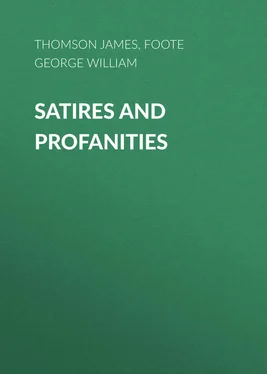George Foote - Satires and Profanities
Здесь есть возможность читать онлайн «George Foote - Satires and Profanities» — ознакомительный отрывок электронной книги совершенно бесплатно, а после прочтения отрывка купить полную версию. В некоторых случаях можно слушать аудио, скачать через торрент в формате fb2 и присутствует краткое содержание. Жанр: foreign_religion, foreign_antique, foreign_prose, на английском языке. Описание произведения, (предисловие) а так же отзывы посетителей доступны на портале библиотеки ЛибКат.
- Название:Satires and Profanities
- Автор:
- Жанр:
- Год:неизвестен
- ISBN:нет данных
- Рейтинг книги:4 / 5. Голосов: 1
-
Избранное:Добавить в избранное
- Отзывы:
-
Ваша оценка:
- 80
- 1
- 2
- 3
- 4
- 5
Satires and Profanities: краткое содержание, описание и аннотация
Предлагаем к чтению аннотацию, описание, краткое содержание или предисловие (зависит от того, что написал сам автор книги «Satires and Profanities»). Если вы не нашли необходимую информацию о книге — напишите в комментариях, мы постараемся отыскать её.
Satires and Profanities — читать онлайн ознакомительный отрывок
Ниже представлен текст книги, разбитый по страницам. Система сохранения места последней прочитанной страницы, позволяет с удобством читать онлайн бесплатно книгу «Satires and Profanities», без необходимости каждый раз заново искать на чём Вы остановились. Поставьте закладку, и сможете в любой момент перейти на страницу, на которой закончили чтение.
Интервал:
Закладка:
The most decided heresy which has come under my own observation was developed in the course of a chat between two miners in a lager-beer saloon and billiard-hall; into the which, it need scarcely be remarked, I was myself solely driven by the fierce determination to carry out my inquiries thoroughly. Bill was smoking, Dick was chewing; and they stood up together, at rather rapidly decreasing intervals, for drinks of such “fine old Bourbon” rye whiskey as bears the honorable popular title of rot-gut. The frequency with which the drinking of alcoholic liquors leads to impassioned and elevated discussion of great problems in politics, history, dog-breeding, horse-racing, moral philosophy, religion, and kindred important subjects, seems to furnish a strong and hitherto neglected argument against tee-totalism. There are countless men who can only be stimulated to a lively and outspoken interest in intellectual questions by a series of convivial glasses and meditative whiffs. If such men really take any interest in such questions at other times, it remains deplorably latent, not exercising its legitimate influence on the public opinion of the world. Our two boys were discussing theology; and having had many drinks, grappled with the doctrine of the triune God. “Wall,” said Bill, “I can’t make out that trinity consam, that three’s one and one’s three outfit.” Whereto Dick: “Is that so? Then you wam’t rigged out for a philosopher, Bill. Look here,” pulling forth his revolver, an action which caused a slight stir in the saloon, till the other boys saw that he didn’t mean business; “look here, I’ll soon fix it up for you. Here’s six chambers, but it’s only one pistol, with one heft and one barrel; the heft for us to catch hold of, the barrel to kill our enemy. Wall, God a’mighty’s jest made hisself a three-shooter, while he remains one God; but the Devil, he’s only a single-shot deringer: so God can have three fires at the Devil for one the Devil can have at him. Now can’t you figure it out?” “Wall,” said Bill, evidently staggered by the revolver, and feeling, if possible, increased respect for that instrument on finding it could be brought to bear toward settlement of even such a difficulty as the present; “Wall, that pans out better than I thought it could: but to come down to the bedrock, either God’s a poor mean shot or his piece carries darned light; for I reckon the Devil makes better play with his one chamber than God with his three.” “Maybe,” replied Dick, with calm candor, strangely indifferent to the appalling prospects this theory held out for our universe; “some of them pesky little things jest shoot peas that rile the other fellow without much hurting him, and then, by thunder, he lets daylight through you with one good ball. Besides, it’s likely enough the Devil’s the best shot, for he’s been consarned in a devilish heap of shooting more than God has; at any rate” – perchance vaguely remembering to have heard of such things as “religious wars” – “of late years, between here and ’Frisco. Wall, I guess I don’t run the creation. Let’s liquor;” manifestly deriving much comfort from the consciousness that he had no hand in conducting this world. Bill acquiesced with a brief “Ja,” and they stood up for another drink. I am bound to attest that, in spite or because of the drinks, they had argued throughout with the utmost deliberation and gravity, with a dignified demeanour which Bishops and D.Ds. might envy, and ought to emulate.
Having thus comforted you with what little of heresy and infidelity I have been able to gather, it is now my painful duty to advance another class of proofs of the general religiousness here; a class of which you have very few current specimens in England, unless it be among the Roman Catholics. All comparative mythologists – indeed, all students of history – are said to agree that the popular legends and myths of any race at any time are of the utmost value, as showing what the race then believed, and thus determining its moral and intellectual condition at that period; this value being quite irrespective of the truth or untruth to fact of the said legends. Hence in modern times collections of old traditions and fairy tales have been excellently well received, whether from the infantile literature of ancient peoples, as the Oriental and Norse, or from the senile and anile lips of secluded members of tribes whose nationality is fast dying out, as the Gaelic and Welsh. And truly such collections commend themselves alike to the grave and the frivolous for the scientific scholar finds in them rich materials for serious study, and the mere novel-reader can flatter himself that he is studying while simply enjoying strange stories become new by extreme old age. All primitive peoples, who read and write little, have their most popular beliefs fluidly embodied in oral legends and myths; and in this respect the settlers of a new region, though they may come from the oldest countries, resemble the primitive peoples. They are too busy with the tough work of subduing the earth to give much time to writing or reading anything beyond their local newspapers; they love to chat together when not working, and chat, much more than writing, runs into stories. Thus religious legends in great numbers circulate out here, all charged and surcharged with faith in the mythology of the Bible. Of these it has been my sad privilege to listen to not a few. As this letter is already too long for your paper, though very brief for the importance of its theme, I will subjoin but a couple of them, which I doubt not will be quite enough to indicate what measureless superstition prevails in these youngest territories of the free and enlightened Republic.
It is told – on what authority no one asks, the legend being universally accepted on its intrinsic merits, as Protestants would have us accept the Bible, and Papists their copious hagiology – that St. Joseph, the putative father of our Lord, fell into bad habits, slipping almost daily out of Heaven into evil society, coming home very late at night and always more or less intoxicated. It is suggested that he may have been driven into these courses by unhappiness in his connubial and parental relations, his wife and her child being ranked so much above himself by the Christian world, and the latter being quite openly attributed to another father. Peter, though very irascible, put up with his misconduct for a long time, not liking to be harsh to one of the Royal Family; and it is believed that God the Father sympathised with this poor old Joseph, and protected him, being himself jealous of the vastly superior popularity of Mary and Jesus. But at length, after catching a violent cold through getting out of bed at a preposterous hour to let the staggering Joseph in, Peter told him roundly that if he didn’t come home sober and in good time, he must just stay out all night. Joseph, feeling sick and having lost his pile, promised amendment, and for a time kept his word. Then he relapsed; the heavenly life proved too slow for him, the continual howling of “all the menagerie of the Apocalypse” shattered his nerves, he was disgusted at his own insignificance, the memory of the liaison between his betrothed and the Holy Ghost filled him with gall and wormwood, and perhaps he suspected that it was still kept up. So, late one night or early one morning Peter was roused from sleep by an irregular knocking and fumbling at the gate, as if some stupid dumb animal were seeking admittance. “Who’s there?” growled Peter. “It’s me – Joseph,” hiccoughed the unfortunate. “You’re drunk,” said Peter, savagely.
“You’re on the tear again; you’re having another bender.” “Yes,” answered Joseph, meekly. “Wall,” said Peter, “you jest go back to where you come from, and spend the night there; get.” “I can’t,” said Joseph. “They’re all shut up; they’ve turned me out.” “Then sleep outside in the open air; it’s wholesome, and will bring you round,” said Peter. After much vain coaxing and supplicating, old Joe got quite mad, and roared out, “If you don’t get up and let me in at once, by God I’ll take my son out of the outfit and bust up the whole consarn!” Peter, terrified by this threat, which, if carried out, would ruin his prospects in eternal life by abolishing his office of celestial porter, caved in, getting up and admitting Joseph, who ever since has had a latch-key that he may go and come when he pleases. It is to be hoped that he will never when tight let this latch-key be stolen by one of the little devils who are always lurking about the haunts of dissipation he frequents; for in that case the consequences might be awful, as can be readily imagined.
Читать дальшеИнтервал:
Закладка:
Похожие книги на «Satires and Profanities»
Представляем Вашему вниманию похожие книги на «Satires and Profanities» списком для выбора. Мы отобрали схожую по названию и смыслу литературу в надежде предоставить читателям больше вариантов отыскать новые, интересные, ещё непрочитанные произведения.
Обсуждение, отзывы о книге «Satires and Profanities» и просто собственные мнения читателей. Оставьте ваши комментарии, напишите, что Вы думаете о произведении, его смысле или главных героях. Укажите что конкретно понравилось, а что нет, и почему Вы так считаете.












